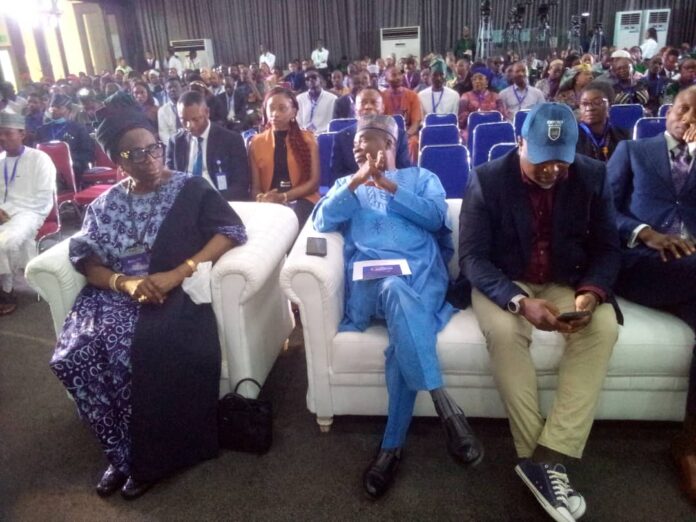Nigerian and African experts have called on their leaders to re-assess their policies, programmes and governance systems towards building an integrated continental development ecosystem that would guarantee prosperity and end poverty.
The eminent personalities from economic, diplomatic, bureaucratic, security, academic, media, and United Nations, gathered at the NAF Conference Centre, Abuja, at the weekend, to chart a roadmap on how Africa can break the cycle of poverty and embrace prosperity, with Nigeria taking the lead.
The event, organised by The Paul Alaje Colloquium (TPAC), with the theme ‘Breaking the Cycle: ‘How Nigeria Can Lead Africa from Poverty to Prosperity’, which laid the solution to Nigeria-Africa poverty on the doorstep of leadership, had four sub-themes; economic transformation, governance and institutions, security and stability, and technology and innovation.
The discussants, drawn from Nigeria, Ghana, Kenya, etc., opined that with purposeful, transparent, and people-centred leadership, Nigeria and indeed, Africa, can end the cycle of poverty in the continent. They made reference to Rwanda, Ghana, Burkina Faso, etc. where the current leadership has shown capacity to turn the fortunes of their countries around.
Speaking to the theme, the Convener, Dr Paul Alaje, advocated: “We must end the cycle of poverty by building an integrated Africa — economically, politically, socially.”
He further made demands from stakeholders: “To our African leaders — stand for institutions that last.
To our youth — embrace technology, lead businesses, demand better systems.
To our private sector — build for Africa, not just for profit.
To our institutions — reform boldly, act transparently, serve humbly.”
Also speaking, Mrs. Alice Obasanjo, wife of Nigeria’s former President, Olusegun Obasanjo, harped on the urgent need to feature women prominently in the governance schemes of Nigeria and Africa if the continent is serious to break the cycle of poverty.
She said: “As a Nigerian woman committed to seeing our nation fulfilling its promises where women are not just observers but architects of sustainable development and inclusion. If Nigeria must lead Africa from poverty to prosperity, we must look beyond our natural resources and harness the true source of our nation’s strength which lies in our people, particularly women.”
Additionally, HRM Drolor Bosso, Adamtey1, Accra, Ghana, a traditional ruler, educationist and diplomat, decried the quality of African leadership and its short-sighted vision, and the pertinent strategic role of Nigeria to drive the cause of prosperity in Africa
“Across Africa, too many people hold positions, but not the responsibility that comes with them. We have people in office, but not always those in office are meant to be leaders with vision. Leadership is not about the seat you sit on, rather leadership is the courage to align systems, choose long-term progress over short-term gains, and build what future generations can depend on.
“Most African nations still export raw materials and import finished. This creates jobs and wealth somewhere else. Our borders are still more restrictive for trade than for trade with overseas. Our institutions are not always predictable enough for long-term investments. These are structural issues, not personal failures.
“Nigeria is positioned to shift. Nigeria will do it and can do it not by force and not by dominance but by coordination, example and consistency. When Nigeria strengthens the systems that support trade, industry, education and the quality of goods, that impact will spread across West Africa and beyond. Because Nigeria is not only big, Nigeria is very influential. It is said and it should be the case that if Nigeria coughs, Africa should catch cold.
“When we link our energies, when we link our energy grids, production costs fall. When we standardize certification and customs, businesses scale across borders. When universities and training centers share resources, talents become mobile. And when governments, traditional institutions, and the private sector move together, development becomes sustainable.
“The African Continental Free Trade Area gives us a platform. Now we need the system to make it real. We need to make it easier for a trader in Kano to sell to Accra, for a manufacturer in Aba to supply Nairobi, for a start-up in Lagos to scale across the continent without facing new rules in every country.
The cycle breaks when Africa stops working in parallel and starts working in partnership. Nigeria has the capacity to lead that shift. This is not just an economic conversation, it is a responsibility to the youth and to the generations that will inherit the outcome of our decisions today,” Bosso submitted.
Some of the speakers at the event included, HRM Drolor Bosso, Adamtey1, Accra, Ghana, Chief Alice Obasanjo, wife of Nigeria’s former President, Olusegun Obasanjo, Dr Abdul-Nashiru Issahaku, former Governor, Central Bank of Ghana, Major Gen. Henry Ayoola (rtd), Mr Mike Ejiofor, former Director, DSS, Amb.Dr Wallace W. Williams, Consul General, Antigua and Barbuda to Nigeria, Prof. Olufemi Saibu, Director, Institute of Nigeria-China Development Studies (INCDS-UNILAG), Dr Tope Fasua, Special Adviser to President Tinubu on Economy Affairs, Mr Peter Obi and Prof. PLO Lumumba, who spoke virtually.

